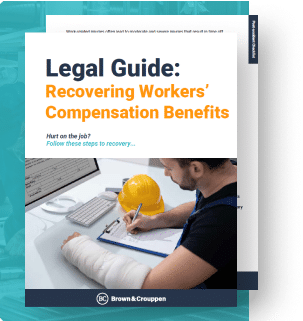Home Practice Areas
Workers’ Compensation Lawyers
FELA Lawyer – Federal Employers’ Liability Act
The Railroad Employers’ Liability Act (FELA) Protects Injured Railroad Workers
This page has been written, edited, and reviewed by a team of legal writers following our comprehensive editorial guidelines. This page was approved by Founding Partner, Terry Crouppen who has more than 40 years of legal experience as a personal injury attorney. Our last modified date shows when this page was last reviewed.
This page has been written, edited, and reviewed by a team of legal writers following our comprehensive editorial guidelines. This page was approved by Founding Partner, Terry Crouppen who has more than 40 years of legal experience as a personal injury attorney. Our last modified date shows when this page was last reviewed.
- Last Modified:
- May 22, 2025
If you are injured, you have a choice between using a union designated attorney or a personal injury law firm like Brown and Crouppen. The best attorney for your needs is not always the first attorney who contacts you.
Railroad Work is Dangerous
Employees of railroad companies are exposed to dangerous working conditions and serious risks of injury every day. Because of this danger, the U.S. Congress passed the Federal Employers’ Liability Act (FELA) in 1908. For over 100 years, this federal law has provided the only legal remedy for railroad workers injured or killed while in the service of the railroad. Railroad employees are not eligible for state workers’ compensation benefits.
The FELA is a fault-based law requiring the injured railroad worker to prove that the railroad was negligent in causing his or her injury in order to recover money damages. If an employee can show that the employer was negligent, the employee may be entitled to compensation for medical bills, lost wages, disability, and pain and suffering.
Find out if you have a case with a free consultation with our railroad accident team by requesting a free case evaluation online.

Use our guide to make a full recovery, understand the workers’ comp process, and learn about key legal considerations regarding your claim.
Know Your Rights as a Railroad Worker
An employee may also be entitled to compensation for injuries caused by the railroad’s violation of federal regulations, including the Locomotive Inspection Act, Safety Appliance Act, and Federal Track Safety Standards.
Under the FELA, an injured railroad worker has the right to a trial by jury. The experienced FELA attorneys at the law firm of Brown and Crouppen, P.C., have handled cases for injured railroad employees across the United States with successful results. Our attorneys have years of experience fighting for injured railroad workers. Our FELA injury lawyers represent employees in all crafts, including engineers, trainmen, mechanical employees, clerks, and maintenance of way employees.
FREE CASE EVALUATION
Get Help With Your Railroad Injury Claim
Being hurt while working for the railroad can mean more than just worrying about medical expenses and wage loss. Railroad workers, especially whistleblowers, who report injuries at work often face immediate discipline and retaliation from management. The injured railroader’s loved ones suffer too.
Our FELA attorneys have decades of combined experience filing FELA cases and representing victims of railroad injuries in federal courts. We focus our attention on providing critical legal advice and helping injured railroad workers through this difficult time in all aspects of their case, from the living room to the courtroom.
Report Your Railroad Injury Immediately
It is critical that every railroad employee injured at work take immediate action:
- Report Your Injury Immediately: Contact your supervisor, local union representative, or a co-worker to report your injury.
- Get Medical Treatment: You have the right to be treated by a physician and hospital of your choice. Report to your doctor specifically how you were hurt and all of your symptoms.
- Complete a Railroad Injury Report: Once you are able, you must complete a written personal injury report. You should complete the report with a witness present, such as your local union representative. Keep a copy of the report for yourself.
- Do Not Give a Recorded Statement: If you have a potential FELA claim, you should not give a statement to the railroad about your injury or your accident.
- Keep All Records: Keep a copy of all relevant documents, including work records from the day you were hurt, time records, wage records, photographs of your accident and injuries, medical bills, medical records, witness names and numbers, and any other evidence concerning your injury or accident.

Get started with a free consultation with one of our skilled Personal Injury Lawyers today.
The railroad company is only concerned with minimizing the cost of your FELA claim. They do not care whether you or your loved one have been seriously hurt or whether you will miss work in the future. The claims representative’s goal is to pay injured workers and their families as little as possible for their injury claims or wrongful death suits.
An experienced FELA lawyer, like the ones at the Brown & Crouppen law firm, has worked on hundreds of injury cases and can provide critical legal counsel to ensure that your FELA claim is handled fairly.
Get A Free Case Evaluation From The Experienced Fela Lawyers At Brown & Crouppen
Getting started is easy. You can call us at 888-801-4736 for a free consultation, or tell us about your case with our Free Case Review form. And remember, there’s no upfront cost to you — if you don’t get paid, we don’t get paid.
FREE CASE EVALUATION
Our Results
TESTIMONIALS

- Last Modified:
- May 22, 2025
SCHEDULE A FREE CONSULTATION

